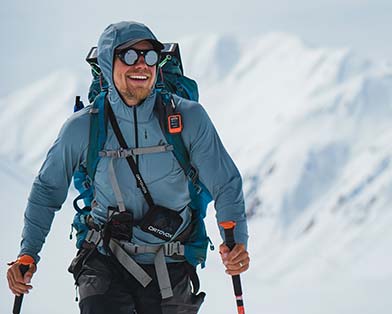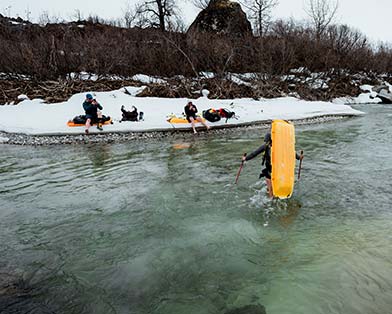I recently delivered a keynote speech for one of the world’s largest insurance companies. In the room were risk managers representing dozens of FTSE 100 and 250 companies. Their job is to ensure that their global organisations can navigate the dynamic uncertainties which exist in our complex world and, crucially, continue to pioneer.
As I took to the stage and all eyes and ears fell on me, my task was to share everything I have learned about navigating grave dangers while taking on ambitious goals.
 Now, I am not a risk manager. At least not by job description. Instead, I am a professional expedition leader and adventurer specialising in guiding teams through the wildest places on earth. Travelling through over 75 countries, I have guided over 500 individuals to Congolese volcanoes, freezing Alaskan peaks, perilous Iraqi mountains, war-damaged Syrian cities, remote Yemeni islands and many more of the least-visited corners of our planet.
Now, I am not a risk manager. At least not by job description. Instead, I am a professional expedition leader and adventurer specialising in guiding teams through the wildest places on earth. Travelling through over 75 countries, I have guided over 500 individuals to Congolese volcanoes, freezing Alaskan peaks, perilous Iraqi mountains, war-damaged Syrian cities, remote Yemeni islands and many more of the least-visited corners of our planet.
The common conception is that my job is leading people on adventures of a lifetime. Of course this is important. My real job though is to ensure people make it home alive.
Through the years I have encountered many close calls. I have faced spies, been detained for 5 days on the Afghan border and interrogated in ten different countries. I have faced minefields, avalanches, deadly earthquakes, and have even spent a week in hospital after contracting meningitis in Somalia.
Through every flirt with danger, I needed to iterate and improve my approach to risk. Over time I have developed a robust approach for handling such uncertainties. While organisations gamble their reputation and existence on their choices, the nature of my job has meant I am staking my life and the lives of my team on the decisions I make. Often the margins for error are zero.
Through my approach, having now guided dozens of expeditions across remote and hostile places, I have maintained a 100% safety record amongst my teams. Here’s how I’ve done it:
Introducing my Triple-A Strategy for approaching risk: Awareness, Anticipation, and Adaptation.
It all begins with Awareness. Awareness is the foundation of navigating uncertainty. We must have a deep understanding of the world or industry which we inhabit. We must be constantly information-gathering, learning about new developments and growing our networks. I have often found that the most valuable insights are the hardest to find. On several occasions, rare information gleaned from
key well-informed individuals has been the thing which has opened new opportunities, or even saved my life. Growing our awareness must be constant. That is how we stay ahead.
 With a foundation of awareness, next comes Anticipation. Anticipation involves using our knowledge to proactively identify potential challenges before they arise. Before each expedition, I immerse myself in exhaustive research – studying terrain maps, weather forecasts, local customs, and geopolitical climates. To this end, I know ahead of time where the problems are likely to arise and can plan accordingly. As a wise mentor once told me: ‘average leaders react, great leaders anticipate.’
With a foundation of awareness, next comes Anticipation. Anticipation involves using our knowledge to proactively identify potential challenges before they arise. Before each expedition, I immerse myself in exhaustive research – studying terrain maps, weather forecasts, local customs, and geopolitical climates. To this end, I know ahead of time where the problems are likely to arise and can plan accordingly. As a wise mentor once told me: ‘average leaders react, great leaders anticipate.’
So we have developed our awareness and built robust plans around the dangers we have anticipated. For many hard challenges, these two steps alone can suffice. But what if we want to embrace our inner explorer? What if we want to pioneer and attempt to do something which has never been done before? When we step out into the unknown, we will encounter ‘unknown unknowns’. Or events which we could never have foreseen until we walk right into them.
This is where the final part of my strategy emerges: Adaptability. When ground-breaking visions meet a complex world, it is imperative for us and our teams to maintain adaptability. A fixed mindset and fixed approach will soon falter. We must rally our teams around our shared vision, with the understanding that we may often need to adapt to reach that goal. Change itself is all part of the journey. When failures and hardships arise, we must respond rapidly and decisively. Months of indecision can be more costly than a bad decision which can be quickly rectified.

I hold the belief that it is exploration which separates humans from all other life on earth. If we humans were not explorers, we would still be living in jungles and caves. It is the human urge to explore which has allowed us to populate the globe from the deserts to the arctic tundra, to visit space and the deep ocean, and even to build artificial intelligence which itself will become an extension of human curiosity.
As we proceed into an increasingly comfortable and risk-free world, many individuals and companies have a growing fear over uncertainty. I urge an alternative approach: a mindset learned through a life of exploration. For those willing to take bold steps into the unknown with the right strategies, we can find opportunities where others see danger. When we embrace the Explorer’s Mindset, we will no longer be the observers of change, but instead we can become the pioneers who shape it.

Oli France
Adventurer & Expedition Leader
Drawing from his experiences leading teams through some of the world’s most challenging environments, expedition leader and adventurer Oli France shares valuable insights on resilience, risk management, and leadership, principles that can benefit anyone navigating high-pressure, high-performance, professional settings.
View Oli France’s full JLA speaker profile.
To enquire about Oli speaking at you next event or to get advice tailored to your specific event needs, don’t hesitate to get in touch with us!